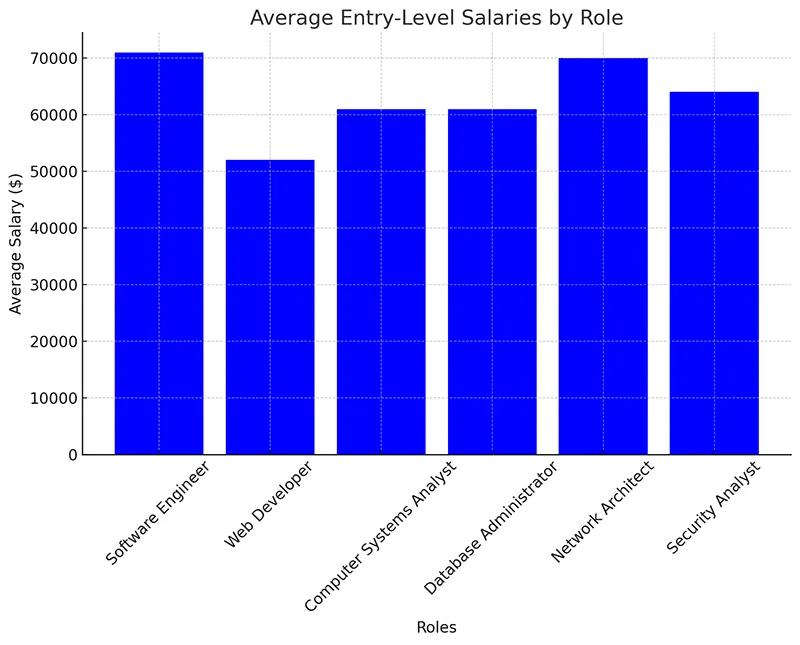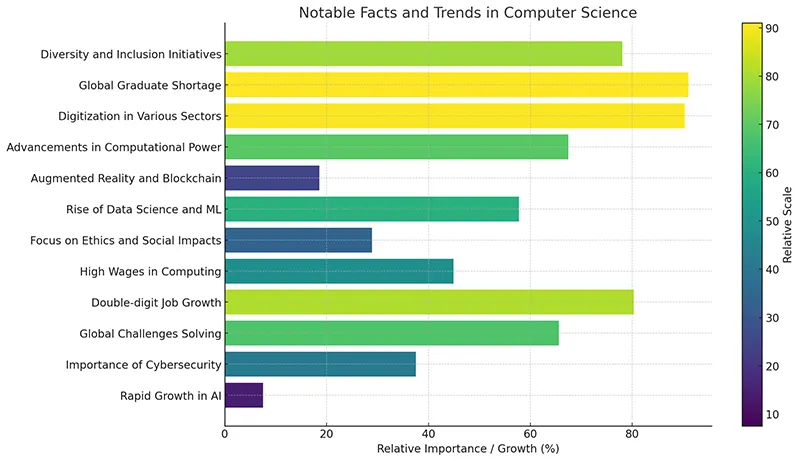
What Is Computer Science? A Beginner’s Guide to the Field That’s Shaping Our World
Computer science is the field of study that focuses on computation, information, and automation using computers and computational systems. Computer scientists use various tools, programming languages, algorithms, and computer hardware and software to design, develop, and analyze computational processes and systems.
Computer scientists work on tasks like writing and testing code, designing algorithms, developing information and security systems, creating simulations and models, and collaborating with engineering teams to build innovative computational products and solutions.
A career in computer science offers an exciting blend of analytical, creative, and practical experiences. Those in the field have the opportunity to work on cutting-edge innovations that shape our increasingly digital world. Computer science professionals find openings in diverse settings, from tech startups to leading software companies, financial institutions, healthcare organizations, government agencies, and more.
With the rise of trends like cloud computing, machine learning, and data analytics, computer scientists will continue to be at the forefront of building the technologies of tomorrow.
Computer Science Overview
| Topic | Aspect | Description |
|---|---|---|
| Computer Science | Definition | Field of study focused on computation, information, and automation using computers and computational systems. |
| Computer Scientists | Role | Use tools, programming languages, algorithms, computer hardware, and software to design, develop, and analyze computational processes and systems. |
| Daily Activities | Common Tasks | Writing and testing code, designing algorithms, developing information and security systems, creating simulations and models, collaborating with engineering teams. |
| Career Opportunities | Scope | Opportunities in tech startups, software companies, financial institutions, healthcare organizations, government agencies. Focus areas include software development, data analysis, cyber security, and artificial intelligence. |
| Skills | Essential Skills | Proficiency in programming languages (Java, Python, C++), strong foundation in mathematics and algorithms, problem-solving, logical thinking, teamwork, and innovative mindset. |
| Future Outlook | Long-Term Forecast | Increasing demand in machine learning, data science, cloud computing. Ongoing talent shortage, expanding technology integration across industries, emerging innovations in AI, robotics, IoT, and quantum computing. |
| Notable Trends | Current Trends | Rapid growth in AI, importance of cybersecurity, expanding role of computing in global challenges, double-digit growth in computing jobs, focus on ethics, prominence of data science, machine learning, cloud platforms, augmented reality, blockchain. |
What Type of Careers Are Available With a Computer Science Degree?
A degree in computer science opens up a wide array of career paths. What can you do with a computer science degree? You can secure careers in software development, data analysis, cyber security, and artificial intelligence, among others, catering to diverse interests and skills within the tech industry.
Some of the most common and in-demand computer science careers include:
- Software Engineer: Design, build, and manage software applications, frameworks, and operating systems
- Web Developer: Create and manage websites, web applications, and front-end user experiences
- Computer Systems Analyst: Design IT solutions to help organizations operate efficiently
- Database Administrator: Maintain, manage, back up, and secure database systems
- Computer Network Architect: Design, implement, and administer communication and network systems
- Information Security Analyst: Protect systems, networks, and data from unauthorized access and cyber threats
- Computer and Information Research Scientist: Explore new computing innovations and find solutions through technology R&D
- Software Developer: Write, update, and maintain software applications and programs
- Computer Programmer: Create code and scripts that allow computer applications and software to function properly
- Computer Hardware Engineer: Design and develop computer components, processors, circuits, and memory systems
What Does a Computer Scientist Do on a Daily Basis?
What do computer scientists do? Computer science majors typically engage in designing algorithms, writing code, analyzing data, and solving complex problems, often collaborating with other professionals to create innovative software solutions.
Daily responsibilities may vary by specialization, but some common tasks include:
- Write, analyze, review, and rewrite code for software programs and applications
- Identify, diagnose, and troubleshoot issues in existing computer systems and networks
- Research and evaluate requirements for new software or applications
- Design secure data storage and management solutions
- Develop algorithms and flowcharts to meet computational requirements
- Write technical reports, memos, and documentation for reference and training purposes
- Collaborate with teams including engineers, designers, analysts, and product managers
- Install, maintain, and upgrade existing computer systems and networks
- Analyze test data, simulations, models, and prototypes to refine a design
- Present findings and recommendations to stakeholders and leadership
Unlock Your Future in Computer Science
Explore Jessup University’s Innovative Program Today!
How Much Could You Earn With a Computer Science Degree?
Individuals with a computer science degree can earn very competitive salaries that vary based on role, experience, and location, with many positions offering above-average salaries for the technology sector.
That being said, the earning potential for computer science graduates is promising and you’ll get an idea of the salaries below:
- Entry-level salaries tend to exceed national averages across other fields.
- Mid-career salaries can reach over $100k, especially in software engineering, systems, data science, and security.
- Strong industry demand creates competitive compensation even for those just starting out.
- Masters, doctorates, and additional certifications can boost salaries significantly.
According to PayScale, average entry-level salaries by role:

What Skills Are Valued in Computer Science?
In computer science, highly valued skills include proficiency in programming, analytical thinking, problem-solving, and adaptability to new technologies and methodologies. Does computer science require math? Yes, and other skills stated below.
Essential computer science skills include:
- Proficiency in programming in computer science with languages like Java, Python, C++
- Strong foundation in mathematics and algorithms
- Complex problem identification and troubleshooting
- Logical thinking and analytical capability
- Interpersonal skills to collaborate in teams
- Design skills to mock up applications and systems
- Innovative mindset to push boundaries of what’s possible
- Lifelong learning to stay updated on emerging technologies
Beyond hard technical ability, many computer science roles involve interacting closely with peers, managers, and clients – making communication and emotional intelligence highly valuable as well.
What Is the Future Outlook for Computer Science Careers?
The future outlook for computer science careers is exceptionally promising, with increasing demand for skilled professionals in areas like machine learning, data science, and cloud computing, reflecting the continuous evolution of technology.
The long-term forecast remains optimistic due to:
- Ongoing talent shortage and competitive salaries in high demand fields
- Expanding integration of technology across industries creates new openings
- Emerging innovations like AI, robotics, IoT, and quantum computing
- Flexible remote work opportunities more accessible than ever
- Demand for computer science educators to nurture new talent
- Efforts to increase diversity, though gaps persist in some areas
Adaptability is key, as computer scientists must keep pace with a dynamically changing landscape. New specializations will surface over time, especially at the intersection with other domains. But fundamental computational concepts endure as key pillars even amidst rapid progress.
What Are Some Notable Facts and Trends in Computer Science?

Some notable facts and trends in computer science include the rapid growth of fields like artificial intelligence, the increasing importance of cybersecurity, and the expanding role of computing in solving global challenges.
Here are some facts and emerging technologies in computer science:
- Double-digit annual growth projected for computer science jobs
- Computing occupations already command very high wages overall
- Rising focus on ethics and social impacts of technological innovations
- Growing prominence of data science, machine learning, and cloud platforms
- Expanding applications for augmented reality, blockchain, IoT devices
- Increasing computational power enabling more advanced capabilities
- Continuous demand across sectors as more processes become digitized
- Global shortage of qualified graduates to fill open computing roles
- More initiatives to increase diversity and inclusion across the field
Jessup University’s Computer Science Degree: Where Faith and Technology Intersect
Jessup University’s Computer Science degree program offers a robust curriculum fusing technological skills and Christian values. With emphasis on blending theory and hands-on learning, the program equips students with both the core foundations and practical abilities to prepare them for vocations in the tech sector.
Specializations offered include:
- Cybersecurity: involves the protection of computer systems and networks from information disclosure, theft, or damage to hardware, software, and data, as well as from disruption or misdirection of services provided.
- Data Analytics: refers to the process of examining data sets to draw conclusions about the information they contain, using specialized software and systems for analysis, data visualization, and decision-making.
- Data Science: encompasses a multidisciplinary approach to extracting knowledge and insights from structured and unstructured data, using techniques from statistics, computer science, and information technology.
- Information Technology: concerned with the use of systems, especially computers and telecommunications, for storing, retrieving, and sending information, playing a crucial role in the operations of modern organizations.
- Software Engineering: What is software engineering? It’s the systematic development and application of engineering approaches to the design, development, maintenance, testing, and evaluation of software.
- Computer Science BA vs BS: Computer Science BA vs BS differ in their educational focus, where a Bachelor of Arts (BA) typically emphasizes a broader liberal arts education with computer science as one of many components, while a Bachelor of Science (BS) concentrates more on in-depth technical and scientific aspects of computer science.
Core courses cover crucial competencies like programming, algorithms, mobile computing, AI, and database systems. The faith-based educational approach promotes ethics and accountability in applying technical knowledge. With small class sizes and mentoring support, students can thrive in their academic and professional aspirations.
The program is designed to deliver transferable skill sets allowing graduates to adapt throughout evolving technological landscapes. Students also gain access to internships, industry connections, and postgraduate employment opportunities in their study of computer science. We also offer online classes as well as in-person on-campus.
Computer Science Careers and Education
| Topic | Aspect | Description |
|---|---|---|
| Computer Science Careers | Types | Software Engineer, Web Developer, Computer Systems Analyst, Database Administrator, Computer Network Architect, Information Security Analyst, Computer and Information Research Scientist, Software Developer, Computer Programmer, Computer Hardware Engineer. |
| Computer Science Degree | Earning Potential | Competitive salaries varying by role, experience, and location. Entry-level salaries often exceed national averages, with mid-career salaries reaching over $100k in key areas. |
| Computer Science Skills | Valued Attributes | Programming languages proficiency, mathematics and algorithms, complex problem-solving, logical thinking, teamwork, design skills, continuous learning, communication, and emotional intelligence. |
| Future of Computer Science | Outlook | Exceptionally promising with high demand in machine learning, data science, cloud computing. Expanding integration of technology, emerging innovations, flexible remote work opportunities. |
| Jessup University Program | Specializations and Approach | Offers specializations in Cybersecurity, Data Analytics, Data Science, Information Technology, Software Engineering. Focus on blending theory and hands-on learning, ethical application of technology. |
Computer Science as a Gateway to the Future
We’ve explored the expansive landscape of computer science – its pivotal role in innovation, diverse career paths it offers, dynamic norms it operates within, and how Jessup University equips graduates to navigate this space.
Computer science is the backbone of technological progress, a catalyst that transforms ideas into reality. It offers the chance to be trailblazers – envisioning breakthroughs before their time has come.
If this resonates with you, the possibilities are endless. Contact Jessup University today to begin your journey where faith and computing converge to drive the future.
Unlock Your Future in Computer Science
Explore Jessup University’s Innovative Program Today!
More Engineering & Technology Articles
-

Essential Skills to Become a Successful Data Analyst
Data analytics is one of the fastest growing fields today. With an increasing number of companies realizing the importance of data-driven decision making, the demand for…
-

The Key Differences Between Software Developers and Software Engineers
The world of software development and software engineering can seem complex to those outside the field. Many people use the terms “software developer” and “software engineer” interchangeably, assuming they…
-

How to Become a Cloud Security Engineer in 2024
Cloud computing has revolutionized businesses and organizations of all sizes by enabling on-demand access to computing resources, storage, application security, and services over the internet….
